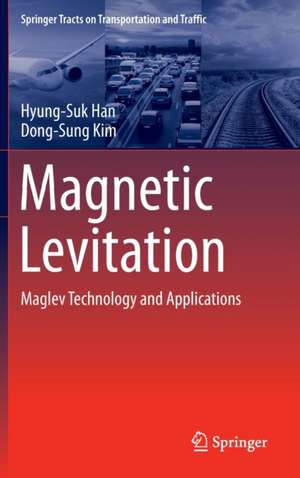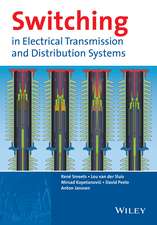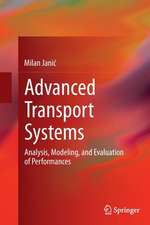Magnetic Levitation: Maglev Technology and Applications: Springer Tracts on Transportation and Traffic, cartea 13
Autor Hyung-Suk Han, Dong-Sung Kimen Limba Engleză Hardback – 9 feb 2016
It includes a history of Maglev science and technology showing thevarious milestones in its advancement. The core concepts, operating principlesand main challenges of Maglev applications attempted across various fields areintroduced and discussed. The principle difficulties encountered when applyingMaglev technology to different systems, namely air gap control andstabilization, are addressed in detail. The book describes howmajor advancements in linear motor and magnet technologies have enabledthe development of the linear-motor-powered Maglev train, which has a highspeed advantage over conventional wheeled trains and has the potential to reachspeed levels achieved by aircraft. However, many expect that Maglevtechnology to be a green technology that is applied not only in rail transportation,but also in diverse other fields; to ensure clean transfer in LCDmanufacturing, in ropeless high speed elevators, small capacity railtransportation, space vehicle launchers, missile testers, energy storage, andso on. These potential applications and their unique challenges and proposedtechnological solutions are introduced and discussed in depth.
The book will provide readers from academia, research institutes andindustry with insights on where and how to apply Maglev technology, and willserve as a guide to the realization of their Maglev applications.
| Toate formatele și edițiile | Preț | Express |
|---|---|---|
| Paperback (1) | 942.76 lei 6-8 săpt. | |
| SPRINGER NETHERLANDS – 31 mar 2018 | 942.76 lei 6-8 săpt. | |
| Hardback (1) | 948.79 lei 6-8 săpt. | |
| SPRINGER NETHERLANDS – 9 feb 2016 | 948.79 lei 6-8 săpt. |
Din seria Springer Tracts on Transportation and Traffic
- 18%
 Preț: 1403.67 lei
Preț: 1403.67 lei - 15%
 Preț: 642.33 lei
Preț: 642.33 lei - 18%
 Preț: 1241.25 lei
Preț: 1241.25 lei - 15%
 Preț: 642.03 lei
Preț: 642.03 lei - 18%
 Preț: 1011.27 lei
Preț: 1011.27 lei - 18%
 Preț: 725.26 lei
Preț: 725.26 lei - 18%
 Preț: 1105.37 lei
Preț: 1105.37 lei - 15%
 Preț: 633.68 lei
Preț: 633.68 lei - 18%
 Preț: 1107.88 lei
Preț: 1107.88 lei - 15%
 Preț: 579.67 lei
Preț: 579.67 lei - 18%
 Preț: 945.30 lei
Preț: 945.30 lei - 18%
 Preț: 956.81 lei
Preț: 956.81 lei - 18%
 Preț: 786.01 lei
Preț: 786.01 lei - 18%
 Preț: 1111.04 lei
Preț: 1111.04 lei - 19%
 Preț: 554.51 lei
Preț: 554.51 lei - 18%
 Preț: 1394.03 lei
Preț: 1394.03 lei - 15%
 Preț: 643.00 lei
Preț: 643.00 lei - 15%
 Preț: 653.14 lei
Preț: 653.14 lei - 15%
 Preț: 639.41 lei
Preț: 639.41 lei - 15%
 Preț: 643.99 lei
Preț: 643.99 lei
Preț: 948.79 lei
Preț vechi: 1157.06 lei
-18% Nou
Puncte Express: 1423
Preț estimativ în valută:
181.54€ • 189.57$ • 149.92£
181.54€ • 189.57$ • 149.92£
Carte tipărită la comandă
Livrare economică 15-29 aprilie
Preluare comenzi: 021 569.72.76
Specificații
ISBN-13: 9789401775229
ISBN-10: 9401775222
Pagini: 247
Ilustrații: XII, 247 p. 260 illus., 252 illus. in color.
Dimensiuni: 155 x 235 x 16 mm
Greutate: 0.54 kg
Ediția:1st ed. 2016
Editura: SPRINGER NETHERLANDS
Colecția Springer
Seria Springer Tracts on Transportation and Traffic
Locul publicării:Dordrecht, Netherlands
ISBN-10: 9401775222
Pagini: 247
Ilustrații: XII, 247 p. 260 illus., 252 illus. in color.
Dimensiuni: 155 x 235 x 16 mm
Greutate: 0.54 kg
Ediția:1st ed. 2016
Editura: SPRINGER NETHERLANDS
Colecția Springer
Seria Springer Tracts on Transportation and Traffic
Locul publicării:Dordrecht, Netherlands
Public țintă
ResearchCuprins
1 Introduction.
2 Fundamentals.
2.1 Introduction. 2.2 Electromagnetics. 2.3 Electronics. 2.4 Mechanics. 2.5 Control and Measurement. 2.6 Linear Motors.
3Permanent Magnet.
3.1 Introduction. 3.2 Material. 3.3 Static Repulsive and Attractive Modes. 3.4 Halbach Array. 3.5 Dynamic Repulsion.
4 Superconducting Magnet.
4.1 Introduction. 4.2 Superconductivity. 4.3 Diamagnetism. 4.4 Flux Pinning. 4.5 Electrodynamic Levitation. 4.6 Passive Damping. 4.7 Active Damping Control. 4.8 Discussion.
5 Electromagnet. 5.1 Introduction. 5.2 Levitation. 5.3 Experimental Vehicle. 5.4 Magnet Design. 5.5 Suspension Control. 5.6 Guidance Control. 5.7 Vehicle/Guideway Interaction. 5.8 Emergency braking. 5.9 Route Switching.
6 Railway Applications.
6.1 Introduction. 6.2 Transrapid. 6.3 Linimo. 6.4 ECOBEE. 6.5 L0. 6.6 Chinese Urban maglev vehicles.
7 Applications.
7.1 Introduction. 7.2 Clean Conveyor. 7.3 Ropeless Elevator. 7.4 Amusement Rides. 7.5 Cargo Conveyor. 7.6 Passenger Transport. 7.7 Aerospace Systems.
2 Fundamentals.
2.1 Introduction. 2.2 Electromagnetics. 2.3 Electronics. 2.4 Mechanics. 2.5 Control and Measurement. 2.6 Linear Motors.
3Permanent Magnet.
3.1 Introduction. 3.2 Material. 3.3 Static Repulsive and Attractive Modes. 3.4 Halbach Array. 3.5 Dynamic Repulsion.
4 Superconducting Magnet.
4.1 Introduction. 4.2 Superconductivity. 4.3 Diamagnetism. 4.4 Flux Pinning. 4.5 Electrodynamic Levitation. 4.6 Passive Damping. 4.7 Active Damping Control. 4.8 Discussion.
5 Electromagnet. 5.1 Introduction. 5.2 Levitation. 5.3 Experimental Vehicle. 5.4 Magnet Design. 5.5 Suspension Control. 5.6 Guidance Control. 5.7 Vehicle/Guideway Interaction. 5.8 Emergency braking. 5.9 Route Switching.
6 Railway Applications.
6.1 Introduction. 6.2 Transrapid. 6.3 Linimo. 6.4 ECOBEE. 6.5 L0. 6.6 Chinese Urban maglev vehicles.
7 Applications.
7.1 Introduction. 7.2 Clean Conveyor. 7.3 Ropeless Elevator. 7.4 Amusement Rides. 7.5 Cargo Conveyor. 7.6 Passenger Transport. 7.7 Aerospace Systems.
Notă biografică
Hyung-Suk Han received the Ph.D. degree inmechanical engineering from Ajou University in 1997. He is the head ofDepartment of Magnetic Levitation and Linear Drive at Korea Institute ofMachinery & Materials. He has worked extensively in maglev which includes the urban maglev ECOBEE andexperimental maglev vehicle SUMA for high speed. His research interests aredynamics simulation, magnetic levitation control and certification of maglevvehicle performances. He has been attempting to apply maglev technology to newapplications such as clean conveyor and amusement rides.
Dong-Sung Kim received B.S. in Mechanics andDesign from Seoul National University and M.S. in Mechanical Engineering fromChangwon National University, and Dr-Ing. in Mechanical Engineering from EcoleCentrale de Nantes in 1996. For 8 years since 1997, he carried out NationalResearch Projects of a developing low-medium speed urban maglev vehicle, as theHead of Vehicle Engineering Group in New Transport Technology Department atKorea Institute of Machinery and Materials. In 2006, he was a core projectmanager of Systems Engineering in the Urban Maglev (ECOBEE) Program funded byKorean Government. He currently continues to try to promote a commercializationand application of the urban maglev system.
Dong-Sung Kim received B.S. in Mechanics andDesign from Seoul National University and M.S. in Mechanical Engineering fromChangwon National University, and Dr-Ing. in Mechanical Engineering from EcoleCentrale de Nantes in 1996. For 8 years since 1997, he carried out NationalResearch Projects of a developing low-medium speed urban maglev vehicle, as theHead of Vehicle Engineering Group in New Transport Technology Department atKorea Institute of Machinery and Materials. In 2006, he was a core projectmanager of Systems Engineering in the Urban Maglev (ECOBEE) Program funded byKorean Government. He currently continues to try to promote a commercializationand application of the urban maglev system.
Textul de pe ultima copertă
This book provides a comprehensive overview of magnetic levitation(Maglev) technologies, from fundamental principles through to thestate-of-the-art, and describes applications both realised and underdevelopment.
It includes a history of Maglev science and technology showing thevarious milestones in its advancement. The core concepts, operating principlesand main challenges of Maglev applications attempted across various fields areintroduced and discussed. The principle difficulties encountered when applyingMaglev technology to different systems, namely air gap control andstabilization, are addressed in detail. The book describes howmajor advancements in linear motor and magnet technologies have enabledthe development of the linear-motor-powered Maglev train, which has a highspeed advantage over conventional wheeled trains and has the potential to reachspeed levels achieved by aircraft. However, many expect that Maglevtechnology to be a green technology that is applied not only in rail transportation,but also in diverse other fields; to ensure clean transfer in LCDmanufacturing, in ropeless high speed elevators, small capacity railtransportation, space vehicle launchers, missile testers, energy storage, andso on. These potential applications and their unique challenges and proposedtechnological solutions are introduced and discussed in depth.
The book will provide readers from academia, research institutes andindustry with insights on where and how to apply Maglev technology, and willserve as a guide to the realization of their Maglev applications.
It includes a history of Maglev science and technology showing thevarious milestones in its advancement. The core concepts, operating principlesand main challenges of Maglev applications attempted across various fields areintroduced and discussed. The principle difficulties encountered when applyingMaglev technology to different systems, namely air gap control andstabilization, are addressed in detail. The book describes howmajor advancements in linear motor and magnet technologies have enabledthe development of the linear-motor-powered Maglev train, which has a highspeed advantage over conventional wheeled trains and has the potential to reachspeed levels achieved by aircraft. However, many expect that Maglevtechnology to be a green technology that is applied not only in rail transportation,but also in diverse other fields; to ensure clean transfer in LCDmanufacturing, in ropeless high speed elevators, small capacity railtransportation, space vehicle launchers, missile testers, energy storage, andso on. These potential applications and their unique challenges and proposedtechnological solutions are introduced and discussed in depth.
The book will provide readers from academia, research institutes andindustry with insights on where and how to apply Maglev technology, and willserve as a guide to the realization of their Maglev applications.
Caracteristici
definitive and comprehensive description of the principles of magnetic
levitation with corresponding applications
Describes the principles of all current and proposedMaglev types, their advantages, disadvantages and challenges to be overcome
Encourages readers to explore the innovative Maglevconcept of contactless operation, and serves as a guide to help the reader develop their own magnetic levitation systems
Includes supplementary material: sn.pub/extras
levitation with corresponding applications
Describes the principles of all current and proposedMaglev types, their advantages, disadvantages and challenges to be overcome
Encourages readers to explore the innovative Maglevconcept of contactless operation, and serves as a guide to help the reader develop their own magnetic levitation systems
Includes supplementary material: sn.pub/extras










